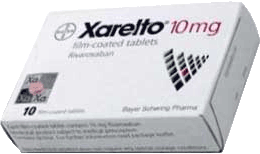This litigation has concluded and we are proud to report that our clients' claims have been successfully resolved. The amounts of all individual client recoveries are confidential, both by settlement agreement and by attorney-client privilege. MLG is no longer accepting cases involving this product.
 Xarelto® is an anti-blood-clotting drug that was first approved by the FDA for sale in the U.S. in July, 2011 to prevent Deep Vein Thrombosis (DVT) in patients having knee or hip replacement surgery.
DVT and pulmonary embolism (PE) are conditions in which blood clots have formed in large veins (DVT) or the respiratory system (PE) – often a post-surgical risk associated with hip/knee replacement surgery.
When blood thickens and blood cells begin to clump together, blood clots often form and pose a serious threat.
These clots often form in the legs – in the deep veins in the calf and thigh muscles.
If these clots form, break off (an embolism) and migrate to the lungs, a potentially fatal condition called pulmonary embolism (PE) can occur.
In November 2011, the FDA also approved Xarelto® for treatment of patients with Atrial Fibrillation not caused by cardiac valve deficiencies.
Atrial fibrillation, or A-Fib, as it is commonly known, occurs when the atrial chambers of the heart (the smaller, upper chambers) beat in an irregular fashion so that they are rhythmically out of sync with the lower, larger chambers of the heart – the ventricles.
A-Fib can be caused by numerous conditions.
A potential consequence of A-Fib is the formation and launch of blood clots in the heart that can migrate to the brain causing an ischemic stroke.
Anti-clotting medications are used to prevent such clots from forming and causing potentially fatal consequences.
Xarelto® is an anti-blood-clotting drug that was first approved by the FDA for sale in the U.S. in July, 2011 to prevent Deep Vein Thrombosis (DVT) in patients having knee or hip replacement surgery.
DVT and pulmonary embolism (PE) are conditions in which blood clots have formed in large veins (DVT) or the respiratory system (PE) – often a post-surgical risk associated with hip/knee replacement surgery.
When blood thickens and blood cells begin to clump together, blood clots often form and pose a serious threat.
These clots often form in the legs – in the deep veins in the calf and thigh muscles.
If these clots form, break off (an embolism) and migrate to the lungs, a potentially fatal condition called pulmonary embolism (PE) can occur.
In November 2011, the FDA also approved Xarelto® for treatment of patients with Atrial Fibrillation not caused by cardiac valve deficiencies.
Atrial fibrillation, or A-Fib, as it is commonly known, occurs when the atrial chambers of the heart (the smaller, upper chambers) beat in an irregular fashion so that they are rhythmically out of sync with the lower, larger chambers of the heart – the ventricles.
A-Fib can be caused by numerous conditions.
A potential consequence of A-Fib is the formation and launch of blood clots in the heart that can migrate to the brain causing an ischemic stroke.
Anti-clotting medications are used to prevent such clots from forming and causing potentially fatal consequences.
The traditional anti-clotting (blood-thinning) medication that has been used by physicians to treat these conditions is warfarin (brand name of Coumadin). Warfarin has been used for decades and regular blood testing enables the doctor to measure and monitor a patient's level of anti-clotting medication. Doing so insures that it is within an acceptable range and not too high – which can cause serious bleeding – and not too low – which provides no medical benefit and can lead to blood clotting. Unlike the new anti-coagulants, there is an antidote to reverse the blood thinning effect of warfarin so if a patient experiences serious bleeding from too much medication or from trauma, the bleeding can be controlled by the introduction of the antidote.
However, there is no effective anti-dote to reverse the anti-coagulative effects of Xarelto®. Therefore, unlike Warfarin (Coumadin®), if unintended bleeding occurs, there is no emergency treatment that will readily reverse the anti-coagulation and thereby stop the bleeding. There have been numerous reports of bleeding injuries, most notably hemorrhages, associated with the use of Xarelto®. As prescriptions for Xarelto® have increased, so too have the number of serious adverse event reports, many of which involve serious bleeding injuries.
This litigation has concluded and we are proud to report that our clients' claims have been successfully resolved. The amounts of all individual client recoveries are confidential, both by settlement agreement and by attorney-client privilege. MLG is no longer accepting cases involving this product.